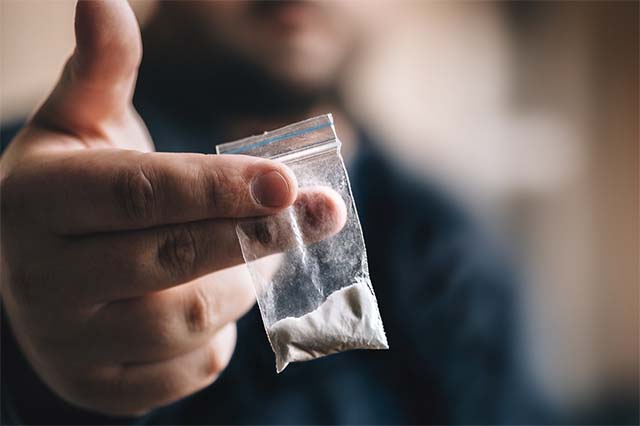
COCAINE ADDICTION TREATMENT
Cocaine is a stimulant drug, abused by an estimated 1.5 million people in the United States alone. While largely used as a party drug, cocaine contributes to over 500,000 emergency room visits per year, significantly impacting the health, longevity, and mental health of its users. Cocaine is recognized as less addictive than other commonly abused drugs such as heroin or other opioids, but its long-term use and abuse does result in tolerance, addiction, and withdrawal symptoms.
If you or a loved one is abusing cocaine, addiction treatment may be your best option.
What is Cocaine?
Cocaine is a strong stimulant which is typically inhaled as powder, smoked, or dissolved and injected. The drug is used recreationally and is illegal in most of the world. Cocaine causes euphoria, alertness, increased feelings of confidence, sexuality, and improved energy, leading many people to take it as a party or clubbing drug.
Cocaine works by acting as a serotonin and dopamine reuptake inhibitor, causing higher concentrations of these neurotransmitters in the brain. This often results in higher blood pressure, increased body heat, and a higher risk of heart attack, stroke, infections, and sudden death.

Cocaine Addiction Symptoms
Cocaine can cause addiction after even a short period of use because the brain quickly adjusts to increased levels of dopamine and serotonin in the brain and goes into withdrawal when those levels are reduced.
Cocaine users typically experience withdrawal symptoms and crashes even after one or two uses, which can be mistaken for simply feeling down or having a cold after short-term use.
A cocaine user will likely display the following symptoms of addiction:
- Dilated pupils
- Sudden or unexplained weight loss
- Frequent runny or bloody nose
- Mood swings and excitability
- Increase in risk-taking behavior
- Changes in sleeping patterns
- Changes in eating patterns
- Deterioration in personal and social habits
- Loss of interest in friends, family, and hobbies
- Light sensitivity
Persons who frequently abuse cocaine will also likely have financial problems, will withdraw from social situations, and may have drug paraphernalia depending on how they are using.

Detoxing from Cocaine
Cocaine detox is relatively simple and often easier than detoxing from a drug such as an opioid. Here, most users begin to experience withdrawal symptoms within the first 24 hours, after which symptoms escalate for the first week, plateau, and often fade within 2 weeks.
Cocaine detox symptoms include disorientation and confusion, strong cravings, depression, anxiety and panic attacks, and an inability to feel. Many also experience general pain, irritability and mood swings, and a significant level of paranoia.
In most cases, a rehab facility will assist individuals through cocaine detox by cutting use of the drug completely, offering medical monitoring/support, and sometimes offering medication to help alleviate the uncomfortable withdrawal symptoms. Users who combine cocaine with alcohol or another drug are likely to experience significantly stronger detox symptoms.
For most individuals, these symptoms will begin to abate after the first 4-5 days. Cravings will persist, but the danger and most of the physical discomfort will have passed, allowing most individuals to step into recovery treatment.
In some cases, your treatment facility or doctor may choose to taper heroin into smaller and smaller doses to prevent major withdrawal symptoms. However, it’s much more likely that the facility will recommend medically supported detox and maintenance using buprenorphine or methadone to prevent withdrawal symptoms.
We specialize in treating cocaine addiction.
Call now to receive a private, no-obligations consultation for yourself or your loved one.
Cocaine Addiction Treatment After Detox

While cocaine withdrawal is less severe than that of other drugs, users who detox must seek out addiction treatment to avoid relapse. Cocaine addiction treatment typically means cognitive behavioral therapy to tackle the underlying problems behind addiction. Most treatment also includes counseling, group therapy, and a range of complementary therapies designed to approach the unique problems contributing to an individual’s addiction.
Cocaine addiction dramatically decreases quality of life, risks life and health, and consistently impairs the addict’s ability to live their life, form relationships, or enjoy themselves without a drug. If you or a loved one is abusing cocaine or another drug, there is help, and it does work.
During treatment, it’s important that counselors and therapists be able to adjust treatment to meet the individual, to screen for and recognize complications such as dual diagnosis, where the individual in recovery is suffering from both a substance use disorder and a mental disorder and respond with targeted therapy and assistance based on individual needs.
Cocaine addiction is extremely common. If you or a loved one is addicted, you are alone and there is help. Evidence-based, individualized treatment at a facility specializing in treating cocaine addiction can help anyone to get clean, manage stress and cravings, and live into a happy, drug free life.
Recover from Cocaine Addiction at Twelve South Recovery.
Your Insurance May Cover Treatment
Call us at 866-311-4524 to learn about your options, or check your insurance coverage online.
SOME OF THE OTHER ADDICTIONS WE TREAT:
INFORMATION REQUEST
CONTACT INFORMATION
ADDRESS
23712 Birtcher Drive,
Lake Forest, CA 92630
PHONE:
866-839-6876
EMAIL:
ADMISSIONS@12SOUTHRECOVERY.COM

























